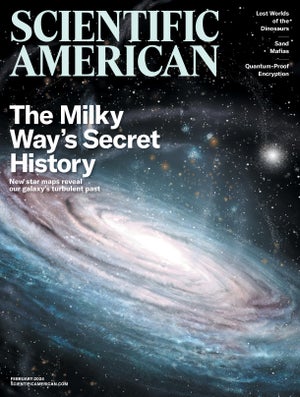
Volume 330, Issue 2
You are currently logged out. Please sign in to download the issue PDF.
Features
The New Story of the Milky Way's Surprisingly Turbulent Past
The latest star maps are rewriting the story of our Milky Way, revealing a much more tumultuous history than astronomers suspected
Why Aren't We Made of Antimatter?
To understand why the universe is made of matter and not antimatter, physicists are looking for a tiny signal in the electron
Tiny Fossils Reveal Dinosaurs' Lost Worlds
Special assemblages of minuscule fossils bring dinosaur ecosystems to life
Sand Mafias Are Plundering the Earth
Organized crime is mining sand from rivers and coasts to feed demand worldwide, ruining ecosystems and communities. Can it be stopped?
Tomorrow's Quantum Computers Threaten Today's Secrets. Here's How to Protect Them
Researchers are racing to create codes so complex that even quantum computers can’t break them
Brains Are Not Required When It Comes to Thinking and Solving Problems--Simple Cells Can Do It
Tiny clumps of cells show basic cognitive abilities, and some animals can remember things after losing their head